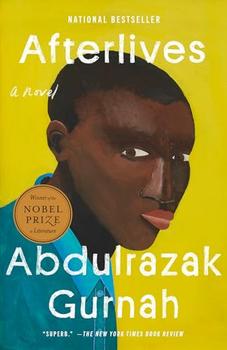Summary | Excerpt | Reviews | Beyond the Book | Readalikes | Genres & Themes | Author Bio

A Novel
by Abdulrazak Gurnah
At that time, the German administration was bringing in new regulations and rules for doing business. Amur Biashara expected Khalifa would know how to negotiate for him. He expected him to read the decrees and reports that the administration issued and to complete the customs and tax forms that were required. Otherwise the merchant kept his business to himself. He was always up to something, so Khalifa was a general assistant who did whatever was required rather than a trusted clerk as he had expected. Sometimes the merchant told him things and sometimes he didn't. Khalifa wrote the letters, went to government offices for this or that license, collected gossip and information and took little presents and sweeteners to people the merchant wanted kept sweet. Even so, he thought the merchant relied on him and his discretion, as much as he relied on anyone.
Amur Biashara was not difficult to work for. He was a small elegant man, always courteous and soft-spoken and a regular and obliging member of the congregation at his local mosque. He donated to charitable collections when a small disaster befell someone and never missed the funeral of a neighbor. No passing stranger could have mistaken him for anything but a modest or even saintly member of the community, but people knew otherwise and spoke of his cutthroat ways and his rumored wealth with admiration. His secretiveness and ruthlessness in business were thought essential qualities in a merchant. He ran his business as if it were a plot, people liked to say. Khalifa thought of him as the pirate, nothing was too small for him: smuggling, moneylending, hoarding whatever was scarce as well as the usual stuff, importing this and that. Whatever was required, he was willing. He did his business in his head because he did not trust anyone, and also because some of his deals had to be discreet. It seemed to Khalifa that it gave the merchant pleasure to pay bribes and make devious transactions, that it reassured him when he made a secret payment for what he desired to happen. His mind was always calculating, assessing the people he dealt with. He was outwardly gentle and could be kind when he wished but Khalifa knew he was capable of real sternness. After working for him for several years, he knew how hard the merchant's heart was.
Excerpted from Afterlives by Abdulrazak Gurnah. Copyright © 2022 by Abdulrazak Gurnah. Excerpted by permission of Riverhead Books. All rights reserved. No part of this excerpt may be reproduced or reprinted without permission in writing from the publisher.
We must believe in luck. For how else can we explain the success of those we don't like?
Click Here to find out who said this, as well as discovering other famous literary quotes!
Your guide toexceptional books
BookBrowse seeks out and recommends the best in contemporary fiction and nonfiction—books that not only engage and entertain but also deepen our understanding of ourselves and the world around us.